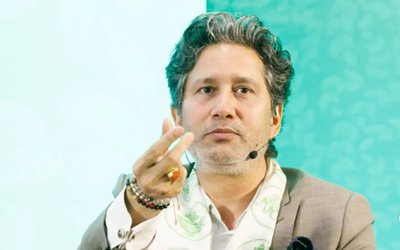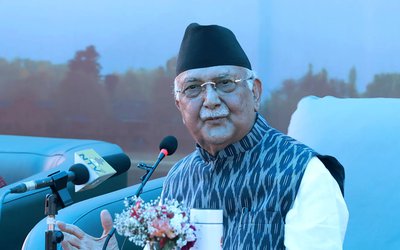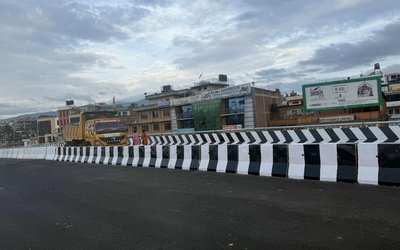More on News






After joining the Learning Center in Dhachwok Village Development Committee of Bhaktapur district, Phulmaya Moktan, a disabled migrant child labor working in a brick kiln in Bhaktapur, has a reason to rejoice: she was admitted to a bridging class that prepared her for transitioning to school.
“It was a great opportunity for me because my family won’t be stressed about my education. I want to go to school as other normal children. This helps to upgrade my education,” said Phulmaya, a resident of Sarlahi, 150 kilometers south east of capital. Her father comes to work in Bhaktapur with her family as a seasonal brick maker.
Phulmaya was physically disabled as her leg was imputed a few years ago when the heat from the hearth burnt her bedding and seared one of her legs just below the knee so badly that it had to be amputated.
Run by World Education’s local implementing partner Child Development Society, the learning center has more than four dozen migrant child workers, who come with their families to work in brick kilns during the winter.
For children like Phulmaya, going to school is simply out of the question not only because of her family’s poverty but also because of her disability. According to a study, whether or not a child attends the school in Nepal is influenced by several factors. A key factor is the cost involved. While in government schools, the cost is free, accessories (school uniforms, stationaries and supplies) are not. Another key factor for disabled people like Phulamaya is the distance to school and transport provisions.
The case of Balkrishna is different. Balkrishna came as a child labor with his parents who were working in a brick kiln in Bhaktapur at the age of eleven in 2005. After attending classes at the non-formal education center in 2010 at the age of 15, Balkrishna joined vocational apprenticeship course. Starting from daily wage earning of Rs. 170 (2 US dollars per day), within a year, he is now making Rs. 500.00 (US dollars 6 daily)working as a mason on the construction of houses.
A vocational apprenticeship and training provides technical skills, networking opportunities, youth employment and builds confidence to cope with the situation of unemployment.
Resham Khullal, a child miner, is enrolled in Grade 4 at Handikhola Primary School located in Kelleri Village Development Committee, ward number 3, of Dhading District. Before he became a regular in a coaching class run by an educational intervention by Prayas Nepal, implementing partner of World Education, his performance was low compared to his peers. Having to work as a child miner was one reason why he could not be a regular in school. Irregularity resulted in his sliding back in his studies and his class teacher who had to manage a large class was unable to provide him one to one coaching.
Resham was fortunate that he got an opportunity to participate in a program run as part of Naya Bato Naya Paila Project’s service in 2010. The couple of hours coaching class has changed the performance of Resham in math, handwriting and overall performance. “ I am proud of Resham, who is now considered amongst a high potential student most likely to succeed,” said Devi Prakash Malla, the school principal.
Out of over one hundred INGOs working in Nepal to uplift the life of rural poor, and marginalized communities, World Education Inc has also worked side by side with the government and other civil society organisations in national development efforts. Be it in making Binita B.K., a 12-year old dalit girl from remote parts of Nepal, literate or in helping former child Maoist combatant like Sita Khadka from Myagdi, World Education Inc engages in Nepal’s development process through educational interventions.
These are only a few cases to show the transformation in the life of child labor through the educational intervention. Not just in Kathmandu valley, World Education has been implementing various programs throughout the country to improve the lives of poor through educational, health and economic interventions and take steps further towards eliminating child labor. “Our work has further enriched our linkages with the grass roots and enhanced opportunities for a more in-depth and ground learning,” said Chij Kumar Shrestha, Country Director, World Education Inc.
Under Naya Bato Naya Paila (NBNP) Project 2009-2012, World Education Inc reached out to child beneficiaries in six worst forms of child labor sector, including brick making, porters, mining, jari work, domestic labor, and commercial sexual exploitation of children. Under this program, World Education is also working to improve income generation opportunities through family support for more than 1300 families of child beneficiaries.
Under NBNP program, World Education works with diverse stakeholders and partners. Along with international partners like Terre des Hommes, ILO, UNICEF, World Education Inc also works with Social Welfare Council, Ministry of Labor and Transport Management, Ministry of Education, Ministry of Women Children and Social Welfare as a project implementing partners in 11 districts. NBNP projects also work closely with municipalities, Central Child Welfare Boards, District Child Welfare Boards, Council for Technical Education and Vocational Training and Employees.
World Education has also attempted to make learning more practical and oriented to life skills. It has worked with different stakeholders to pilot a pre-vocational curriculum package for public schools and is working with implementing partners in vocational training as well as vocational apprenticeships.
World Education Inc, in partnership with UNICEF for Children in Armed Forces and Armed Groups and School as Zone of Peace (SZOP), has brought successful results in children integration and enabling the SZOP mandate.
Working with National Family Health Project, the World Education also helped to make differences in the life of more than 8000 women and girls through educational interventions focused on health.
As an organization dedicated to improving the lives of the disadvantaged through economic and social development programs, World Education provides technical assistance in non-formal education for adults and children with special emphasis on literacy, income generation, small enterprise development, education for the work place, environmental education, reproductive health, maternal and child health, HIV/AIDS education and refugee orientation.
One of the important side of the projects designed by World Education is to contribute to individual growth as well as to community and national development.






